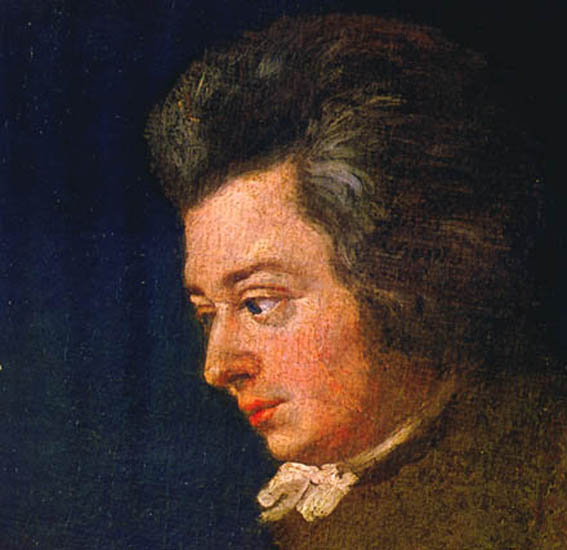Wolfgang Amadeus Mozart began playing instruments at age 3 and composing his own music by age 5. He spent his childhood touring Europe with his sister and father, performing for royalty and nobility, and over the rest of his life would compose more than 600 pieces of music. At age 35, however, he was laid to rest in a pauper’s grave. Here is a brief summary of the rise and fall of the man everybody knows as Mozart…
1756 – Johannes Chrysostomus Wolfgangus Theophilus Mozart is born in Salzburg, Austria to a middle-class family. His father, Leopold Mozart, is violin master to the Prince-Archbishop of Salzburg. His mother, Anna Maria Pertl, daughter of an official in the Archbishop’s court, nearly dies giving birth to him. He has an older sister, Nannerl, who is 5 years older. His other 5 siblings do not survive childhood.
Age 3 – Wolfgang takes an interest in his sister’s music lessons and that gets him started in music. Soon he can perform little pieces. He learns to compose at the same time he learns to play. He also has an interest in Mathematics.
Age 6 – His father, sensing a chance to make a fortune from him, takes him and his sister on tour with him. They perform in Munich and Vienna and Wolfgang begins to get famous. He begins playing for the royal family in Court.

Age 7 – Wolfgang writes his first sonata. The Mozart family becomes famous and print shops sell their portraits.
Age 8 – They travel to Paris and London to perform for the royal families there. Wolfgang continues composing little pieces. At the end of this tour however, the whole Mozart family falls ill— Wolfgang with inflammatory fever.
Age 10 – They travel to Vienna for another tour and both Nannerl and Wolfgang catch small pox. When he recovers, he writes his first opera, La Finta Semplice, and another called Bastien et Bastienne. In the meanwhile, he continues composing music.
Age 13 – They do a tour around Italy. Wolfgang is made member of the Philharmonic Academy of Verona and is knighted by the Pope. However, even though his works are highly praised, they do not lead to important engagements.
Age 17 – Wolfgang is no longer considered a child prodigy. He continues composing and performing for the Archbishop in Salzburg.
Age 21 – He starts signing letters as Wolfgang Amadè.
Age 22 – Wolfgang goes on tour with his mother, during which Wolfgang has at least 4 love affairs, including one with the sister of a non-reciprocal crush, Constanze Weber, who he sleeps with. He notices however, that while people remember him as a child prodigy, there is no longer any interest in him. Now when he plays in salons, everybody talks over his music. He is offered a post as an organist in Versailles but her refuses it. Then, while they are in Paris, his mother dies.
Age 23 – He returns to Salzburg and spends the next 2.5 years playing for the Archbishop. He continues composing.
Age 25 onwards – Wolfgang quits his job with the Archbishop, leaves Salzburg, moves to Vienna and marries Constanze Weber, with whom he does not have any intellectual companionship. It is her mother who had forced them to marry. He becomes a music teacher by day and plays at a concert nearly every evening. He builds a good reputation but makes only a modest income.

Age 27 – His first child is born and dies within 2 months.
Age 28 onwards – While still teaching and performing in salons, he continues composing. His second child, Karl Thomas Mozart is born.
Age 30 – He composes the Marriage of Figaro which will go on to set the model for all comic opera of the future. He does not profit much from it financially, however, and moves on to other things very quickly after. His third child is born and dies within a month.
Age 31 – Because of the Marriage of Figaro, he is commissioned an opera, Don Giovanni, in Prague, at which he ends up playing at concerts too. Don Giovanni is a great success. Wolfgang’s father dies. Wolfgang’s fourth child is born.
Age 32 – His fourth child dies. Don Giovanni is not a success in Vienna. However, Wolfgang is appointed Chamber Musician and Court Composer for the Courts of Vienna. He starts to go into debt and has to beg for and borrow money to pay his daily expenses. He cannot pay those back either. He starts taking on commissions from patrons but despite travelling in luxury, he returns to Vienna financially worse than before. Wolfgang starts composing very little music.
Age 33 – His fifth child is born and dies shortly after birth. His wife falls ill and becomes an invalid. He starts to drink and cheat on her. Now, he composes only when commissioned.
Age 34 – Wolfgang borrows 800 florins to travel to Frankfurt so that he can perform at the coronation of Leopold II but the visit ends with no financial gain. When he returns to Vienna, he borrows another 2000 florins.

Age 35 – His sixth child, Franz Xaver Wolfgang Mozart is born. Under stress, Wolfgang starts composing again with renewed creative energy and takes on commissions to make music for musical boxes, a clock maker, the Carnival orchestra and an opera. The incessant production makes him ill. He becomes bed-ridden at his home and speaks of his illness as an attempt by his enemies to poison him. After 2 hours of delirium one night, he dies. He is given a cheap funeral, entered in records as ‘Wolfgang Amadeus’ and buried in a pauper’s grave amongst other paupers.
More life summaries available here.
Photographs: Public Domain. Compiler: Sy
Sponsor or support the Life Summary series here.
If you found this article useful:


Say something: